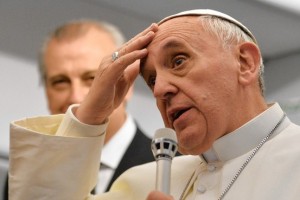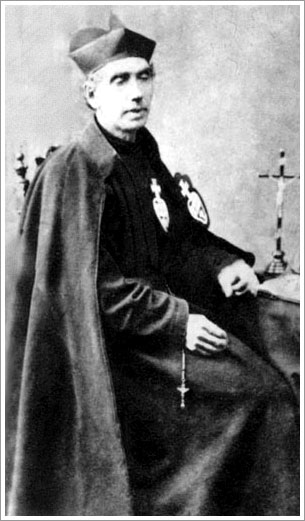Today is the feast of St Charles of St Andrew, also known as St Charles of Mount Argus. Canonised in 2007, he is the most recent "Irish" Saint - I put Irish in inverted commas because St Charles was actually Dutch, but became "more Irish than the Irish themselves" (as the saying goes) by spending most of his priestly ministry here among us.
Born Joannes Andreas Houben in Holland in 1821, he joined the Passionists in Belgium in 1845, and was professed as Br Charles of St Andrew in 1847. He was ordained priest in 1850. Sent to England two years later, he met with many Irish emigrants and ministered to them. Fr Charles fell in love with the Irish: saw their strengths, but also their weakensses and difficulties - particularly their problem with alcohol. In his ministering to them, he heard a call to go to Ireland and spend his life there.
That call was confirmed in 1857 when he was sent with other Passionists to found a new community in Dublin. With the exception of two years, he would spend the rest of his life in Ireland, travelling around the country raising money to build St Paul's Retreat and its church at Mount Argus in Dublin, and ministering to those who came to the monastery.
He quickly became known as Fr Charles of Mount Argus and he endeared himself to the faithful. He was gifted with numerous charismatic gifts, among which were the gift of healing and discernment which revealed the heart of his mission: that of hearing confession and healing the sick. Up to the day of his death, people made their way out to Mount Argus to be healed, to go to confession, and to attend his Mass during which he often fell into ecstasy.
Recognised as a Saint by many, he had his enemies - some of those who attended Mass in Mount Argus, for example, thought his Mass was too long, and so were forever complaining: his superior eventually had to stand by him at the altar and put pressure on him. Whenever he entered a mystical ecstasy, his superior would shake him until the came out and continued the Mass. It seems these people did not really appreciate the presence of a Saint or the manifestation of the mystical - unfortunately it is an attitude still to be found in Ireland: we have many "watch gazers" and "time keepers" at Mass on Sundays: the obvious sign of a serious need for renewal.
Fr Charles was a victim to false allegations during his lifetime. A man arrived one day at the monastery and asked the Saint to bless a barrel of water: Charles did so gladly. However, the man bottled the water and sold it throughout Dublin city as Holy Water blessed by the Saint of Mount Argus. Complaints flooded in to the Passionists, and even though Charles pleaded innocence, his superiors did not believe him and he was sent back to England in disgrace. When the truth emerged two years later, he was rehabilitated and sent back to Ireland.
Charles died on the 5th January 1893 with a reputation for holiness. His Cause was opened in 1935 and reached a successful conclusion on the 3rd June 2007 when Pope Benedict XVI canonised him. Sadly, he is unknown by most Irish people, very little effort was made in the run up to his canonisation - another opportunity missed by the Church in Ireland. His tomb is in the Passionist Church in Mount Argus and is a wonderful place to go and pray in the presence of the sacred remains of a holy priest who followed Christ with deep fidelity. It is worth a visit.
I believe that St Charles was given to Ireland as a gift, and indeed he is a gift to all priests. In his life and virtues we see how a true Christian is to live, and for us priests we see what is most important in our vocation. At the heart of St Charles's ministery, indeed his life as a priest, was the Mass, confession and prayer. The Mass was the centre of his life - in his offering it we see another Padre Pio - indeed St Charles is Ireland's St Pio. Like St Pio, his ministry in the confessional reminds us of the importance of that sacrament - a message we need to hear as many today abandon the sacrament. In his healing ministry he always told those who came to him that true healing was to be found in confession.
This morning in Rathkenny we celebrated the Saint's feast, although, strangely, the new translation of the Missal (Veritas version) does not include the texts for his memoria.





